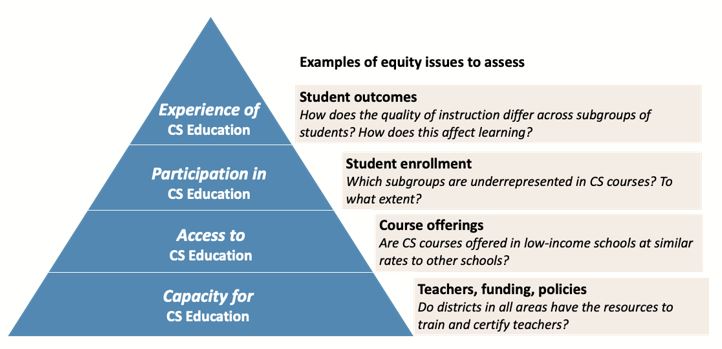
Conducting education research and evaluation during the season of COVID-19 may make you feel like you are the lone violinist playing tunes on the deck of a sinking ship. You desperately want to continue your research, which is important and meaningful to you and to others. You know your research contributes to important advances in the large mural of academic achievement among student learners. Yet reality has derailed many of your careful plans.
If you are able to continue your research and evaluation in some capacity, attempting to shift in a meaningful way can be confusing. And if you are able to continue collecting data, understanding how COVID-19 affects your data presents another layer of challenges.
In a recent discussion with other K–12 computer science evaluators and researchers, I learned that some were rapidly developing scales to better understand how COVID-19 has impacted academic achievement. In their generous spirit of sharing, these collaborators have shared scales and items they are using, including two complete surveys, here:
-
- COVID-19 Impact Survey from Panorama Education. This survey considers the many ways (e.g., well-being, internet access, engagement, student support) in which the shift to distance, hybrid, or in-person learning during this pandemic may be impacting students, families, and teachers/staff.
- Parent Survey from Evaluation by Design. This survey is designed to measure environment, school support, computer availability and learning, and other concerns from the perspective of parents.
These surveys are designed to measure critical aspects within schools that are being impacted by COVID-19. They can provide us with information needed to better understand potential changes in our data over the next few years.
One of the models I’ve been using lately is the CAPE Framework for Assessing Equity in Computer Science Education, recently developed by Carol Fletcher and Jayce Warner at the University of Texas at Austin. This framework measures capacity, access, participation, and experiences (CAPE) in K–12 computer science education.

Figure 1. Image from https://www.tacc.utexas.edu/epic/research. Used with permission. From Fletcher, C.L. and Warner, J. R., (2019). Summary of the CAPE Framework for Assessing Equity in Computer Science Education.
Although this framework was developed for use in “good times,” we can use it to assess current conditions by asking how COVID-19 has impacted each of the critical components of CAPE needed to bring high-quality computer science learning experiences to underserved students. For example, if computer science is classified as an elective course at a high school, and all electives are cut for the 2020–21 academic year, this will have a significant impact on access for those students.The jury is still out on how COVID-19 will impact students this year, particularly minoritized and low-socio-economic-status students, and how its lingering effects will change education. In the meantime, if you’ve created measures to understand COVID-19’s impact, consider sharing those with others. It may not be as meaningful as sending a raft to a violinist on a sinking ship, but it may make someone else’s research goals a bit more attainable.
(NOTE: If you’d also like your instruments/scales related to COVID-19 shared in our resource center, please feel free to email them to me.)

Except where noted, all content on this website is licensed under a Creative Commons Attribution-NonCommercial-ShareAlike 4.0 International License.






 EvaluATE is supported by the National Science Foundation under grant number 2332143. Any opinions, findings, and conclusions or recommendations expressed on this site are those of the authors and do not necessarily reflect the views of the National Science Foundation.
EvaluATE is supported by the National Science Foundation under grant number 2332143. Any opinions, findings, and conclusions or recommendations expressed on this site are those of the authors and do not necessarily reflect the views of the National Science Foundation.